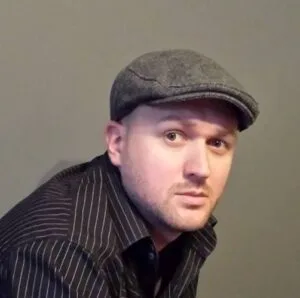
James P. Sumner
In the latest in our series of in-depth interviews with successful self-published authors, we hear from English thriller writer James P Sumner, whose methodical record of building up his self-publishing business began with an unplanned first step: getting fired from his day job – which he deems the best thing that ever happened to him!
Now keen to share the secrets of his success with indie authors at an earlier stage in their journey, he offers many take-home points including:
- learning from your mistakes and putting them to positive use
- going out of your way to build a bond with existing readers
- constantly evaluating your markeitng to maintain sales momentum
What's your proudest achievement to date as an indie author?
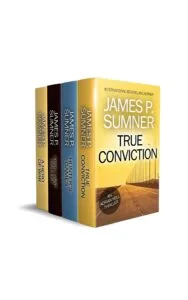
Sumner's first box set in the Adrian Hell series
I’m lucky to have reached a few notable milestones in the relatively short time I’ve been writing. I was a 2015 winner of Amazon’s Kindle Scout program, and the novel that won hit #1 in the Kindle store in multiple countries, albeit briefly. That was incredible, as was seeing all my books hit the bestseller lists on Amazon at some point. I also recently hosted my first book signing event, which went very well indeed, and was great fun to be a part of.
But I have to say the biggest achievement for me so far came on June 9th, 2016 – that was the day I was fired from my full-time job. Not much of an achievement, when you put it like that, granted, but that was the day when writing stopped being a hobby, and became my life.
I took a chance on trying to make a living from writing books, and since that day, I have been able to provide a comfortable life for my family through my writing, whilst also supporting a steadily-growing business. That was always the big dream for me, and being able to live it every day is indescribable.
What's the single best decision you ever made?
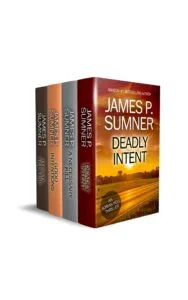
Second Adrian Hell box set
When I first started out, I (somewhat naively) used a vanity publishing service to get the first iteration of my debut novel out there. It tanked. Completely.
Initially, I chose to unpublish the title as a way of cutting my losses. I’d tried, and failed, to be a writer, and it had cost me money in the process. But by then I’d already got the bug for writing, and I choose to revisit the book and publish it again myself.
My decision to not give up, and to teach myself the business of self-publishing from the ground up, was the best thing I ever did. It wasn’t easy, but it was worth it.
What's been your biggest surprise as an indie author?
I haven’t had too many surprises with regards to my books, as I usually have a specific aim in mind when I start a new project, and I work hard to make sure it goes the way I would like.
By far the biggest surprise of my career in general came at the 2017 London Book Fair, when someone asked to have their picture taken with me!
It was strange, because they knew who I was, and I didn’t expect anyone to. It was the most “celebrity” I’ve ever felt, and it was a great experience that I never expected.
What's your greatest challenge – and how you deal with it?
The hardest part of this for me is regularly maintaining the level of sales needed to keep the business running. Thanks to people like Nick Stephenson, Joanna Penn, and Mark Dawson, I have a good idea about how the marketing side of things works.
It’s not easy staying visible and relevant in the marketplace.
Advertising costs money, and I’m personally so dependent on the performance of my Facebook campaigns, that if one becomes ineffective, my sales plummet. A large part of my day is spent monitoring adverts, looking for trends, tweaking what works to be more effective, and trying to spot what isn’t working in time to fix it before it breaks. It requires time and patience, as well as a little faith and self-belief that you know what you’re doing.
How to get/stay in a creative mood?
I’m quite lucky in that respect, as I’ve never really struggled with ideas for novels.
It’s as if a lifetime of potential plot points has been stored up inside me, and now I’m able to write books, they just come flooding out of me.
I’m always lying awake at night, making notes and jotting down new ideas, so the creative part of me is always working.
I love what I do, and the passion fuels the motivation.
Except in a morning. Mornings suck, and my brain doesn’t start until 10am, so I drink coffee!
How do you remain productive/motivated?
Motivation comes pretty easy to me, so that’s not a problem. I enjoy what I do, so it’s not difficult to choose to start doing it. I have to admit, however, productivity is a whole other beast!
It’s an uphill battle right from the start, because the bulk of my advertising is done on Facebook – not easy to spend so much time on there and not get distracted!
I do have a few techniques I’ve picked up along the way to help though:
- When I’m engrossed in a new writing project, I tend to write solidly for thirty minutes, then break for fifteen minutes, whether I’m ready to or not. That keeps me excited about restarting work, and on track for my somewhat modest three-thousand-words-a-day target.
- I also try to keep any notes/timelines/plot points etc off my computer, so I’m not encouraging myself to flick between multiple screens, which adds to the distraction.
- I have a corkboard hung on the wall above the PC in my office, and I use cards and thumbtacks to pin up the timeline for the book, any details on characters, notes etc, so I can see them all at a glance.
What's your favourite thing about being an author-publisher?
I love the creative freedom it provides me.
I’ve never been traditionally published, and the one time I was courted by an agent, I quickly found myself writing a book for him, and not for me, which didn’t feel right at all. I get a real buzz from having total access to every part of the publishing process.
I have a touch of OCD when it comes to my books, and the good thing is, I get to publish the book that’s exactly what I want. I don’t have to compromise on anything, and I feel very honest when it comes to my work.
I also enjoy the interaction with my audience. I know exactly who my readers are, and it’s awesome spending time getting to know them. That’s important to ensure success, but I also feel it’s the least I can do, given the time and money they’ve invested in me.
What are your top tips for other ALLis?
A lot of people will say building a mailing list is a top priority (and they would be right), so I don’t want to give you the same advice…
My two top tips are these:
- Nurture your audience. Spend time getting to know them, and they will reward that time with sales. I use my Facebook adverts to build my Facebook author page as standard, but I also set up a “members only” Facebook group, which consists of five hundred superfans who are invaluable. I spend most of my time there, providing updates via live Facebook videos (usually whilst I’m walking my dog), which they love, and chatting with them about things other than my books. It’s great seeing conversations start between my readers about other topics, and seeing the community grow. Making that group was one of the best decisions I ever made, and I would recommend it to anyone. Your main author page can be for quick updates and advertising, but that group is for getting to know your readers, and for them to get to know you. Well worth it.
- Treat your books like a business. Take calculated risks, aim to grow your income steadily through different advertising platforms, assign yourself budgets (no matter how big or small) for certain things, and don’t rush into anything. If you’re serious about making a living from writing, the first step is to think of it as a business, and think of yourself as a brand. Build your own platform via a website and social media. Look to grow your audience, and give them something exclusive as a thank-you for joining you on your journey. I only spend £5 a day on gathering new e-mail addresses through advertising. I gain anywhere between 10-20 new names from that, which is around 600 a month. Yes, I could do more with more investment, but I have a larger advertising budget for sales than I do for growth, which is how I prefer things at the moment.
Remember, all the big indie success stories are people who work hard at making their books into a business, who think long-time about what they want to achieve, and how they’re going to do it.
What’s next for you?
I don’t set myself deadlines as such. I treat this like a job – I work Monday to Friday, nine to five, and books take as long as they take to be finished.
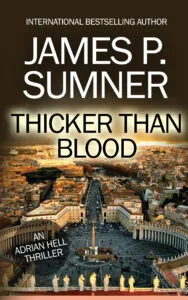
Adrian Hell #7 – book #8 is Sumner's current work-in-progress
I have two projects I’m looking to plan out and begin next. The first is book eight in my ongoing Adrian Hell series, and the other is a new thriller series which serves as a spin-off from my main character. It will allow me to write about someone else, in a different style, and I’m looking forward to it.
I’m also looking to get more involved in the indie community – try to get gigs on panels, or more appearances at industry events.
Sharing the secrets of his #selfpub success here is indie #author @TheFirstHellion Share on XI’m still learning, and still growing, but I feel I’m at a stage where I can give something of value back to fellow authors who are just starting out on their journey, and I want to explore ways in which I can do that.

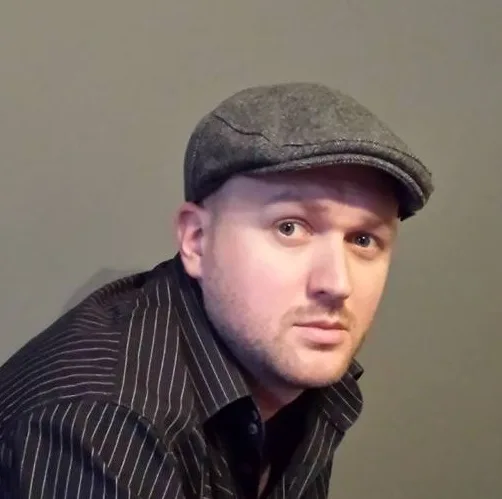
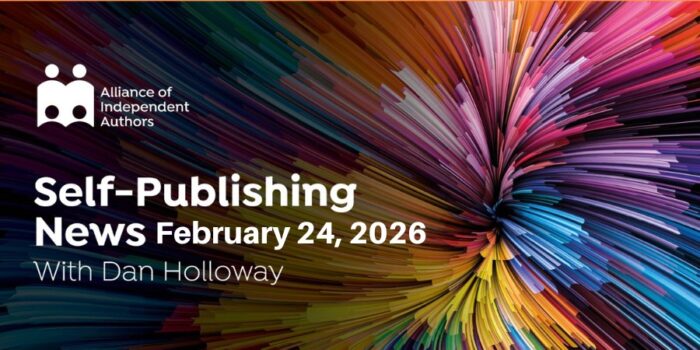


Is James P Sumner, my ex neighbour with parents Stewart and Mary, and Sister Emma? If so I have news for his parents about my mother!
Please ask him to get in touch if it is him.
I’m not sure but we’ll convey your message Anthony.
Thank you for sharing and advice! Quitting one’s job and supporting one’s self by writing sounds great. How do you pay the bills, not to mention the expenses of self publishing when you’re first starting out?
Great interview. I have learned a lot about James Sumner from this interview and it sounds like he has his writing and publishing working out for him. I am a major fan of the Adrian Hell series and will read the rest of his books as soon as I am finished with reading the whole series over again. I am back on A Necessary Kill again. Fantastic character and author!!